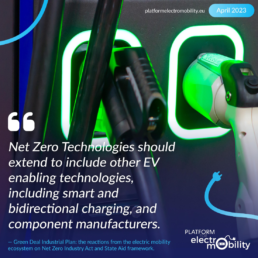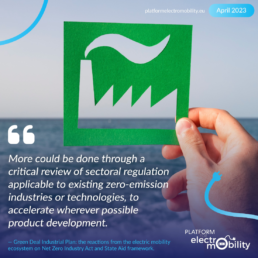Green Deal Industrial Plan:the reactions from the electric mobility ecosystem on Net Zero Industry Act and State Aid framework.
The Platform for electromobility welcomes the European Commission’s Net Zero Industrial Act (NZIA) and Temporary Crisis and Transition State aid Framework (TCTF) for accelerating the transition of the EU’s net zero industrial sectors towards climate neutrality by 2050. As currently proposed, the NZIA is a positive start for a necessary holistic and long-term strategic plan, detailing specific financial and regulatory support measures for addressing all global current and future challenges, securing an EU-built industrial ecosystem of sustainable transport and ensuring bespoke strategic autonomy for every key sector identified.
We understand and welcome the package of both NZIA and TCTF as a tool for accelerating clean-tech industries with proposed non-financial regulatory measures. In this paper, we outline how the narrow scope of the proposed NZIA may fail in its aim of supporting European specificities. In addition, certain financial measures should also be included; without these, the NZIA may fall short of achieving its intended goals and fail to provide the required support for European clean industries.
Scope
Given the importance of reducing greenhouse gas emissions from the transport sector and industries, and the fact that Europe’s transport systems make up part of its critical infrastructure, we consider that mobility industries that provide zero-emission vehicles (ZEV) – all transport modes considered – as well as charging stations, software and other ZEV enabling tech, should be considered part of the ‘Clean Tech’ sector.
We welcome the inclusion of battery, charging infrastructures and grid technologies in the Annexes as Strategic Net Zero Technologies, yet we remain concerned about the lack of recognition for the entire EV value chain in the proposal. Net Zero Technologies should be extended to include other EV enabling technologies, including smart and bidirectional charging as well as component manufacturers.
A more flexible approach to those sectors that will be key for the EU’s future competitiveness should be adopted. Downstream industries, such as ZEV manufacturers, should be better considered and included in the scope of the Regulation to secure economic opportunities for supported upstream industries, such as cell manufacturing. Considering the NZIA as a non-financial tool, extending the scope to other sectors of the energy transition would increase Europe’s ability to be competitive in strategic sectors for the decarbonisation of transport, without undermining the support of already-included sectors such as battery manufacturing.

Non-financial measures
To create the enabling conditions for the European clean transport industry to prosper, several issues must be urgently tackled.
The Green Deal is the EU’s centrepiece climate policy. It is now necessary to provide the regulatory certainty for businesses that will allow them to invest in the transition of the EU economy to a sustainable model that is consistent with the 2050 target of climate neutrality. Europe should lock-in ambitious Green Deal Fit for 55 policies (including the Trans-European Network for Transport Guidelines revision, the 2035 zero-emission objective for new cars and vans) and introduce similar policies for trucks and non-road mobile machinery in order to phase-out fossil trucks between 2035-40.
As specified in the proposal, and in order to ensure regulatory certainty, it is important that Member States endorse and adopt legislative and non-legislative actions relating to the Green Deal Industrial Plan. Such actions should be incorporated into national planning processes and should prioritise clean industries in energy and climate plans. New measures should also align with existing governance regulations and contribute to national energy and climate goals. National Recovery Resilience Plans should address the new elements from upcoming regulations, and the ways in which clean value chains can support energy and climate targets.
For the forthcoming mid-term revision of the Multiannual Financial Framework, we welcome recent guidelines pushing Member States to amend National Recovery and Resilience Plans towards energy independency via renewable energy deployment and greening industries. Given the strong synergies between renewable energies and electric mobility, the former will inevitably form a key pillar of a European sustainable, electric transportation system.
We welcome NZIA’s measures for reducing unwieldy bureaucracy and speeding up overly cumbersome and slow procedures for the granting of permits, through national single points of contacts and maximum durations for permitting procedures. The ‘regulatory sandbox’ approach for new technologies can also help support their faster market readiness.
More could be done, however, through a critical review of the sectoral regulation applicable to existing zero-emission industries or technologies, to accelerate product development, capacity for sustainably extracted raw materials and renewable energy, validation, certification and market access, wherever possible. Sectoral action plans could draw on the Mobility Ecosystem Transition Pathway released by the Commission in March 2022.
In order to fast-track best-in-class projects, we welcome that Member States will be required to appoint a contact person for net zero strategic projects.
For modernisation, more should be done to digitalise the approvals process and to increase expertise and skills in local and national authorities.

The Platform supports provisions oriented towards a more binding approach to sustainability / Most-Economic Advantageous Tender (MEAT). The NZIA proposes specific sustainability and resilience criteria that public authorities need to take into account during public procurement procedures, in addition to price or cost. Public authorities shall give the tender’s sustainability and resilience contribution a weight of between 15% and 30% of the award criteria. This goes beyond the only price criteria, and is aligned with the MEAT principle, which is of great importance for the transport sector.
The question of which criteria for which technology should not be tackled in great detail within the NZIA, but rather in some upcoming guidelines from the European Commission. These would support public procurement authorities grasping sustainability and resilience criteria.
In the longer term, improved coordination between universities and industries on European research strategies and priorities is essential: Europe is home of many leading research institutes, but the research sector is overly fragmented to be able to outperform some global regions in the race to develop clean tech. The role of Horizon Europe and of Public-Private Partnerships should be reinforced to address this. European research institutes are also vital in equipping the European workforce with necessary skills for the transition.
The introduction of Net Zero Academies in the NZIA goes in the right direction, but these would require more details and specification. For example, the United States’ IRA has conditionality measures to link public support with social policies at company level. The EU should support companies in their commitment for upskilling and reskilling their workforce. It should foster and promote synergies between public and private sectors, in order to create training programmes fit for the net-zero value chain, such as the ReKnow University.
Financial measures
We welcome the simplification of EU State Aid rules in terms of Aid intensity, eligible costs definition and higher thresholds for State Aid exempted from prior notification for a temporary period. This is a useful immediate measure that will support investments in the electromobility value chain in the EU.
Subsidies should be granted to projects that match a certain set of conditions. This way, public funding (to support Operational Expenditure – OpEx and Capital Expenditure – CapEx) will be directly linked to key parameters for ensuring the competitiveness and resilience of Europe’s electromobility industries for all transport modes. This will be in line with EU targets on, for example, sustainability and R&D&I as well as health, safety and environmental standards.
Specifically on batteries, we support the changes introduced in the revised Temporary Crisis and Transition Framework, which – if leveraged effectively by countries – have the potential of loosening national state aid rules to support EU-based battery production. Financial support should focus on the processing and refining of those battery materials required within the European Union. To ensure predictability and bankability for companies looking to invest in EU-based battery material production, any financing mechanism should be based on clear, pre-determined criteria and focus on output production, similar to the production-based incentives (USD/kWh) introduced by the US IRA.
However crucial the update of State Aid rules may be, the requirement to preserve a level-playing-field between European companies based in different Member States, since some are more fiscal liable and thus more likely to subside industries than others. Fragmentation of the internal market is a genuine risk:
Consequently, European competitiveness and a level European playing field require joint EU funding to ensure a pan-European investment capacity. The future European Sovereignty Fund must be established in close coordination with European clean tech industries, to ensure its cost-effectiveness, added value and complementarity with existing EU funds. ZEV-related supply chains, refining and processing materials for battery production capacity and related grid upgrades should be priority sectors for its operations, and inspiration should be drawn from the simple support provided, for example, in the US IRA, with its Advanced Manufacturing Production Credits. Without such matching of funds, there can be no global level-playing-field for battery manufacturing.
Financial measures should prioritise the development of a European battery value chain, including cell and component manufacturing, critical metals refining and processing. This should introduce minimum production targets for companies manufacturing in Europe (this can be via tax breaks or grants to scale-up manufacturing, or direct subsidies for startups who could be excluded from tax credits/deduction due to limited taxable income), uphold Europe’s environmental acquis and remain focused on the most value-added parts such as cathodes and cathode precursors. Batteries are central to scaling up ZEV and renewables. Missing this value chain to Asia or the US will undermine Europe’s strategic resilience and exclude the bloc from the resulting industrial and jobs benefits.
For battery manufacturing, the US IRA provides an Advanced Manufacturing Production Credit (Opex support) of $35/kWh produced. We call for EU policymakers to match such support in order to help its European battery industry compete on more equal terms. Without such matching, there can be no global level-playing-field for battery manufacturing.
In parallel, Europe’s competitiveness and leadership on downstream industries (road and rail vehicles manufacturing) must be enhanced through dedicated, co-created action plans. Europe should also reward an accelerated implementation of the carbon footprint, circularity and due diligence provisions in the new EU Battery regulation by targeting subsidies at companies leading on sustainability.
Funding should support urgently-needed investments in grid upgrades and capacity, training and reskilling. There should be a specific focus on ensuring that workforce shortages in the electrical and software sectors are urgently addressed. This should go beyond financial mobilisation through the existing opportunities set out by the European Commission (Innovation Fund, Invest EU, Recovery and Resilience Facility; Horizon Europe and cohesion policy programmes), which have not yet reached convincing scale or momentum. To support its ambitions, the European Commission should come forward with a concrete funding plan/guideline to support the deployment of Net-Zero Technologies.

